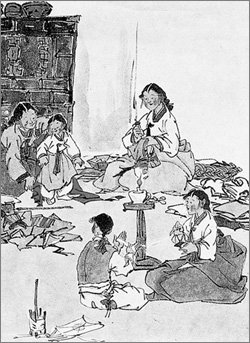Stealing Fertilizer from a Rich Family Brings Fortune
Stealing Fertilizer from a Rich Family Brings Fortune
Posted February. 06, 2005 22:50,

The National Folk Museum of Korea has recently published the first volume, January, of a dictionary series on Korean seasonal customs (six volumes total), breaking a record for spending the biggest budget for a single project, 4.2 billion won.
The dictionary on Korean customs on times and seasons embraces almost everything, including myths, dress and ornamentation, moderation in eating, games, folk songs, proverbs, and ceremonies kept on commemoration days on both lunar and solar calendars in four seasons. Being different from the existing dictionary on customs, it features a time order basis of months and days rather than going through Korean alphabetical order. January especially is teeming with seasonal customs, so the first volume of January was dissected from the volume of spring.
In January we have two big holidays--Lunar New Year and the first full moon on the lunar calendar--out of Koreas four biggest holidays, which are Lunar New Year, the Dano festival, the first full moon and Chuseok (Korean Thanksgiving). Also, we have the onset of spring: Ibchun (around 3-4 February), the first rainfall of the year: Woosu (around February 18), and many other customs that came from the wishes for a full harvest of the years agriculture. The following are some idiosyncratic seasonal customs.
Stealing excrement-
In North Pyeongan province, as soon as the roosters first crowed on the morning of lunar New Years Day, farmers would customarily steal fertilizer from a rich family and dump it onto their fertilizer piling. According to folklore, the energy from the wealthy family would move to the stealers house. In a similar context, there was the custom of stealing fortune soil. On the first full moon, people would steal soil and earth from wealthy families and scatter it their house grounds.
Driving away the noctilucence ghost-
This custom came from the belief that if a ghost called noctilucence visited and stole childrens shoes, bad fortune would haunt the house all year. People hid childrens shoes and set up a long pole with a net in the main outdoor-floored room or between stone steps and a yard. They considered that the ghost would become oblivious of stealing shoes while counting the holes in the net. Usually, people stay up all night on New Years eve and need a sweet sleep on New Years night after spending the day doing ancestral worshipping ceremonies and giving formal bows of respect. So the custom seemed to originate from minds looking out for the night.
Bring cherry flowers to the in-laws (wifes parents) when visiting for bows of respect-
This is a proverb related to the lunar New Year. It sounds somewhat romantic. In general, people give formal bows of respect within the first 10 days of January, but this proverb enunciates visiting in-laws should be no earlier than spring when the cherry flowers bloom. This proverb was used when disparaging married men who were taking care of their in-laws.
Having an entire fish-
This custom was transmitted in Gyeongsang, Gyeonggi, Chungnam, Ganwon provinces. On the first full moon day of the lunar New Year, people used to eat a whole herring as a side dish for breakfast. They wished for good health for the entire year, and wished not to have many flies at home during the summer by eating a herring, which has less of a fishy smell. Also, they prayed for a full harvest by treating farm servants well.
Gathering nine loads of dried branches and having nine meals-
On the first full moon of the lunar New Year, people joined this activity on a nationwide scale, believing that trying every activity nine times would bring health and diligence to them.
Besides, people credited every first, eighth, 13th, 23rd, and 24th of each month as the day of In-dong-toh, and believed that handling soil would evoke the anger of the Earth god. So they were especially cautious not to handle soil on lunar New Years Day. The root of the word dong-ti originated from dong-to, which means transferring soil. And the seventh day of January on the lunar calendar was called the human day with keeping an attentive attitude towards people in mind. In Yonggang, Pyeongnam province, the 19th day of January was Wifes Day, and people customarily welcomed womens visits to neighbors.
Besides these customs, which may slowly becoming forgotten, the January volume of the dictionary series has 595 items concerning seasonal customs on lunar and solar calendars such as opening ceremonies at work and lunar New Years greetings.
The dictionary of Korean seasonal customs will have volumes on spring and summer within this year, and autumn and winter volumes are planned for 2006. The sixth volume will be an index for the first five books.
02-3704-3226 (The National Folk Museum of Korea)
Chae-Hyun Kwon confetti@donga.com



![“한동훈, 정치생명 걸고 무소속 출마해 평가받는 것 고려할만”[정치를 부탁해]](https://dimg.donga.com/c/138/175/90/1/wps/NEWS/IMAGE/2026/01/19/133186982.1.jpg)


![[한규섭 칼럼]왜 여당 지지율은 떨어지지 않는가](https://dimg.donga.com/c/138/175/90/1/wps/NEWS/IMAGE/2026/01/19/133189257.1.png)
